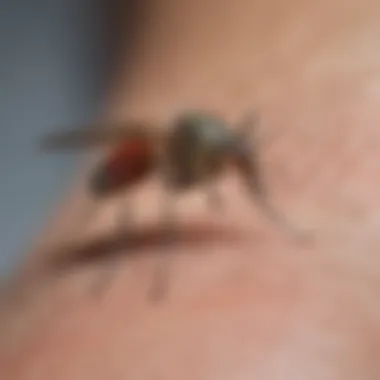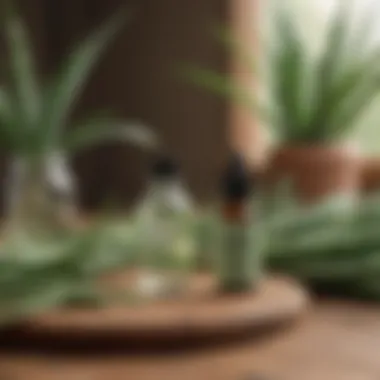Expert Strategies to Soothe Itching from Mosquito Bites


Intro
Mosquito bites represent a ubiquitous annoyance, especially in warm climates. They provoke itching, which interrupts daily activities and can heighten discomfort. However, to effectively manage these bites, it is essential to understand what happens in the body after a mosquito feeds. Generally, the itching emerges primarily due to histamines, chemicals released by the body to combat foreign substances introduced through saliva. By recognizing this mechanism, we can then investigate various strategies to alleviate the frustration that accompanies insect bites.
In this guide, multiple effective methods for immediate relief and long-term prevention will be explored. Equipped with surgical precision and clear insights, this article aims to provide readers with a detailed toolkit for managing and preventing jumping in the middle of a tranquil evening or disrupting outdoor leisure with relentless itching.
Immediate Relief Techniques
When confronted with the immediate discomfort of a mosquito bite, several practical solutions can bring swift relief. Consider the following:
- Cold Compress: Applying a cold compress to the affected area can significantly reduce swelling and soothe the itching. Ice wrapped in a cloth is often recommended.
- Topical Treatments: Over-the-counter treatments like hydrocortisone cream can provide quick alleviation. These creams work by reducing inflammation and calming the irritated skin.
- Natural Remedies: Home remedies, such as aloe vera or a dab of honey, can offer temporary comfort while also nourishing the skin.
The above strategies serve immediate needs, but they do not address the root cause. Understanding and implementing longer-lasting preventative measures will ultimately go far in minimizing the aggravation from mosquito bites.
Long-term Prevention Strategies
To avoid the predicament of frequent mosquito bites, embracing a multifaceted approach based on knowledge and preparation is vital.
- Insect Repellents: Using EPA-registered repellents can reduce bite occurrences. Chemicals like DEET or picaridin are particularly effective. Ensure to apply these products before venturing outdoors, especially at dawn and dusk when mosquitoes are most active.
- Clothing Choices: Light, loose-fitting clothing can shield the skin. While darker colors attract more mosquitoes, shades like white or khaki may offer some protection.
- Environmental Control: Mosquitoes breed in stagnant water. Regularly emptying sources of standing water around it is paramount to limit breeding potential.
- Screen Usage: Installing proper screens on windows and doors can sift out these pests. This simple yet effective step creates a barrier between indoor comfort and outdoor annoyance.
It is essential to balance immediate relief strategies with proactive measures for long-term avoidance of mosquito bites. Such foresight can save discomfort and ensure outdoor activities remain painless and enjoyable.
Culmination
The management of itching resulting from mosquito bites necessitates a strategic blend of immediate relief and preventive methodology. The application of cold packs, topical treatments, and exploring natural remedies pave the way for temporary relief. Coupled with sound avoidance techniques including insect repellent usage and environmental control, individuals can effectively mitigate the discomfort caused by mosquito bites. These insights pave a way to better habits, rendering outdoor endeavors both accessible and pleasant.
Understanding Mosquito Bites
Understanding mosquito bites is crucial for effectively managing and alleviating the discomfort associated with them. This section explores the fundamental reasons behind mosquito bites and their impact on the human body. Having a solid grip on the biology and the mechanisms of itchiness will help individuals make informed decisions on both immediate relief techniques and preventative measures. By immersing in this topic, readers will not only grasp why encountering a mosquito bite can lead to significant irritation but also learn ways to calm their responses productively.
The Biology of Mosquitoes
Mosquitoes belong to the family Culicidae and the process inflicting an itchy bite is a complex interplay between the insect’s biology and the human body. Notably, female mosquitoes, which require a blood meal for egg production, possess a specialized mouthpart known as a proboscis. The proboscis allows them to pierce the skin and access blood vessels.
Upon biting, the mosquito injects saliva, which contains anticoagulants that prevent blood coagulation. The protein-rich saliva is essential for the mosquito's feeding process but poses challenges for the individual receiving the bite. The proteins in the saliva induce a local immune response, which is what triggers the feeling of itchiness and surrounding inflammation. Understanding this biological backdrop is essential because it highlights that the itching sensation is not arbitrary; rather, it stems from a deliberate interaction initiated by the mosquito attempting to extract blood.
Why Bites Cause Itching
The itchiness from mosquito bites can be seen as an evolutionary mechanism. When a mosquito bites, it injects saliva that introduces foreign proteins into the skin, prompting the immune system to respond. This immune reaction leads the body to release histamines, which act as chemical messengers. The release of histamines results in blood vessel dilation, increased edema, and the characteristic itch associated with these bites.
While itchiness is usually a mild nuisance for most people, it can have problematic implications when individuals consciously or reflexively scratch the area. This behavior can lead to skin irritation, open wounds, and even potential infections. Recognizing the cause of this itch response makes it more manageable, allowing individuals to adopt effective strategies for alleviation, such as topical treatments or natural remedies. Understanding why this discomfort occurs paves the way for adopting targeted approaches to mitigate itching and protect skin integrity post-exposure.
High-key takeaway: Understanding the biology of mosquito bites and their itch-inducing properties equips individuals with the insight needed for effective and informed treatment options. This comprehension lays the groundwork for both immediate relief and long-term preventive actions.


Immediate Relief Techniques
It is vital to address mosquito bite discomfort quickly. Timely relief can prevent scratching, which might lead to further complications like infections. Utilizing effective methods offers a dual benefit of soothing and calming the irritation promptly. When individuals experience mosquito bites, finding strategies that manage immediate discomfort can enhance the overall experience when engaging in outdoor activities.
Cold Compress Application
Applying a cold compress is one of the simplest ways to relieve itching. This technique involves placing a cloth soaked in cold water, or an ice pack, directly on the afflicted area. The cold temperature numbs the skin, which reduces the sensation of itching.
Benefits and Considerations
- Quick Relief: Cold compresses provide near immediate relief, stopping the itching sensation in its tracks.
- Inflammation Reduction: They can also reduce swelling and redness around the bite.
- Ease of Use: Cold compresses are easy to prepare and use and need no special ingredients.
Beisure is a common point. Ensure the compress isn't too cold to avoid skin damage.
Topical Anti-itch Creams
Topical treatments are commonly applied to relieve itching. These creams often contain ingredients designed to alleviate discomfort caused by mosquito bites. Using them can improve the overall comfort by targeting the reaction at the skin level.
Key Characteristics
- Hydrocortisone Cream: It is prevalent for reducing inflammation and swelling and can be highly efficient.
- Benzocaine or Lidocaine Creams: These products numb the area, decreasing itching immediately.
- Antihistamines: Some creams may contain antihistamines that counteract histamine responses causing itching.
Important to read labels to select an appropriate cream for your skin type.
Natural Remedies for Instant Relief
Aloe Vera
Aloe vera is well-known for its soothing properties. This plant gel is used to hydrate and calm irritated skin. Its anti-inflammatory elements can alleviate the discomfort around mosquito bite sites.
Aloe vera is a natural choice due to its low risk of allergic reactions compared to chemical creams. However, pure aloe is preferred to avoid additives that might irritate skin further. Alexandria received its reputation partly from treatments promoting skin health.
Baking Soda Paste
Baking soda can also be an effective remedy. By making a paste from baking soda and water, the solution serves as a neutralizer for acidic skin conditions that develop after a mosquito bite.
It's easy to apply. Prior to use, test on a small skin area, ensuring no allergic reaction occurs. An interesting feature is its versatility, allowing use in various home remedies as well.
Oatmeal Baths
Adding colloidal oatmeal to a soothing bath can significantly help in relieving itching. The oatmeal forms a protective barrier on the skin and offers hydration.
Colloidal oatmeal is a trusted skin barrier agent, reducing moisture loss and calming inflammation. One of its unique features is that it is safe for most skin types, sometimes even accommodating sensitive skin. The downside may be the preparation time but its effectiveness in easing discomfort oftentimes justifies the extra effort.
Long-term Prevention Strategies


Long-term prevention strategies are crucial in managing discomfort from mosquito bites. These strategies do not only focus on alleviating the immediate impacts but also work to reduce the likelihood of further bites. Implementing preventive measures allows individuals to enjoy outdoor activities with less concern about potential mosquito irritation. By understanding how to alter one's environment and personal habits, it becomes feasible to create a less hospitable area for mosquitoes, thus decreasing their presence and the associated discomfort.
Home and Lifestyle Adjustments
Using Screens and Nets
Using screens and nets is a very effective way to keep mosquitoes out of homes. This method serves as a physical barrier that prevents mosquitoes from entering living spaces. A key characteristic of this approach is the material used; tightly woven mesh acts as an effective deterrent. The unique feature here is that aside from its effectiveness, it does not rely on chemicals or odors that might cause people discomfort. Furthermore, it is environmentally friendly. The advantage is clear: by maintaining a mosquito-free home, individuals can significantly reduce the exposure to bites. However, this method requires maintenance, as potential wear or damage to screens demands prompt attention.
Choosing Appropriate Clothing
Choosing appropriate clothing is another smart approach to combat mosquito bites. Light-colored garments tend to be less attractive to these pests. The fabric type can also influence comfort; tight-weave materials are recommended. Here, the choice of clothing serves to create a physical hurdle behind which skin remains protected. One significant advantage of this tactic is its dual utility for social settings. However, the downside is that certain styles might limit breathability, especially in hot weather. Selecting clothing wisely can help navigate these disadvantages.
Eliminating Standing Water
Eliminating standing water is crucial in managing mosquito populations. Mosquitoes thrive in stagnant water where they breed. Thus, regularly checking for water accumulation in places like flower pots and gutters can make a significant difference. The key point is not only immediate family involvement but also the broader community. Communal efforts yield noticeable impacts and help to restrict breeding grounds. A major advantage to this method is its long-lasting effectiveness. However, it might require sustained effort, and olds habits may be hard to change initially.
The Role of Insect Repellents
Insect repellents, when used correctly, provide an effective line of defense against bites. Active ingredients such as DEET, picaridin, or oil of lemon eucalyptus contribute notably to reducing mosquito interaction. The benefits are clear: proper application protects exposed skin for extended periods. Additionally, formulations spread easily, enhancing familiarity with regular use. Recognizing when and how to apply repellents can maximize their effectivity while minimizing discomfort during outdoor activities.
Essential Oils for Prevention
Citronella
Citronella constitutes a well-known natural insect deterrent. Its aromatic profile is unappealing to many insects, making areas treated with citronella less favorable for mosquitoes. A beneficial characteristic of citronella is that it is non-toxic for humans and pets. Its unique property enables folks to use it in homes and while engaging in outdoor leisure without worrying about harmful effects. One disadvantage, however, is the necessity for frequent reapplication, as its effectiveness can diminish quickly.
Lemon Eucalyptus
Lemon eucalyptus oil provides additional protection with its significant natural repellency. Key characteristics include its pleasant scent and powerful formula that is considered as effective as synthetic alternatives. This makes lemon eucalyptus a popular choice in the eco-conscious community. While efficient at providing long-lasting protection, a notable aspect of this oil is skin sensitivity among some individuals; careful consideration of personal reactions is essential.
Lavender
Lavender denotes not just a soothing aroma but also effective mosquito deterrent properties. Its floral scent is attractive to humans but repels mosquitoes. This dual capacity reflects a considerable benefit: the potential for enhancing relaxation while simultaneously guarding against bites. The traditional appeal allows its infusion in various products, including oils and lotions. However, as with any essential oil, it is advised to patch test without overwhelming the skin's natural texture to avoid potential allergic reactions.
Overall, these long-term prevention strategies serve not just to diminish current mosquito inconvenience, but they also focus on sustainable practices that promote personal and community health.
Medical Interventions
Medical interventions play a significant role in managing the discomfort associated with mosquito bites. While immediate and natural remedies can provide temporary relief, some situations may require a more formal approach. Situating medical interventions within the wider context of health care enhances comprehension of bite treatment. A professional consultation can help ascertain the severity of the allergic reaction and tailor the most effective course of action.
The benefits of seeking medical assistance include assessing potential infections from persistent scratching, understanding individual allergies, and gaining access to prescription medications that may not be available over the counter. This proactive approach caters to any short−term or long−term needs, avoiding worsening conditions.
Additionally, it is crucial for anyone with complex symptoms or those prone to severe allergic reactions to be aware of medical solutions earlier to moderate itchiness effectively. By recognizing underlying patterns of sensitivity, individuals can maintain a better quality of life during peak mosquito seasons.
When to Seek Professional Help


Recognizing when to consult a healthcare professional hinges on the individual’s reaction to mosquito bites. Deciding factors may include:
- Persistent itching that lasts longer than a few days.
- Development of rash or swelling outside the initial bite area.
- Signs of infection such as increased redness, warmth, or discharge.
- Previous severe allergies to insect bites or stings.
These indicators suggest that the condition might be more complicated than a typical mosquito bite. Seeking promptly professional guidance ensures appropriate treatment takes place, reducing the risk of complications or prolonged discomfort.
Prescription Creams and Treatments
For many, over-the-counter solutions may not suffice in alleviating mosquito bite itchiness, which leads to the consideration of prescription medications. Healthcare providers can prescribe steroid creams, such as hydrocortisone, to reduce inflammation specific to the reaction.
Another option includes topical anesthetics, typically containing lidocaine or pramoxine. These creams aim to numb the area, providing immediate relief from the urge to scratch. In a more challenging outbreak scenario, oral antihistamines can alleviate itching by blocking histamine responses in sensitive individuals.
Beyond the topical applications, those suffering from severe allergic reactions may require corticosteroids or injectable medications like epinephrine to manage extreme reactions. Australian Health Service reports suggest judicious use of these treatments for particular allergens can avert further complications in maximum longing health needs.
It is essential to follow health professional advice regarding when and how to use prescription medications to avoid potential side effects.
Lifestyle Considerations
In the context of combating itching from mosquito bites, the importance of lifestyle considerations cannot be overlooked. These factors address the way we live, interact with the environment, and even manage the health of our skin. Changes in our daily routine and choices regarding health can significantly affect the severity and frequency of mosquito bites. After all, prevention is the cornerstone of control when dealing with any type of irritation.
Dietary Choices that Influence Skin Health
Dietary choices play a crucial role in skin health and can thus influence how our skin reacts to mosquito bites. Consuming a balanced diet rich in vitamins and minerals is essential.
Foods high in omega-3 fatty acids, such as fish and flaxseeds, can help maintain healthy skin. Similarly, antioxidantsfound in fruits and vegetables like berries and leafy greens can protect skin cells from damage. Furthermore, vitamin E and C are vital in skin repair and contribute to overall skin resilience.
Additionally, the consumption of processed foods and sugars may increase systemic inflammation, potentially heightening skin sensitivity. Therefore, limitting these can be beneficial in not only reducing skin irritation but also enhancing existing treatments our skin may require in response to bites. Remember, a well-nourished body often translates to improved skin health and resilience.
Hydration and Skin Moisture
Hydration is another fundamental aspect of maintaining skin health. The skin itself is the largest organ of the body, and its health is directly linked to water intake. A well-hydrated body leads to adequately moisturized skin, which can better withstand irritants such as mosquito bites.
It is widely accepted that drinking at least eight glasses of water a day helps keep our skin hydrated. Incorporating hydrating foods, such as cucumbers, oranges, and watermelons, also contributes to overall skin hydration.
Additionally, applying moisturizer can preserve skin moisture levels, thus providing a protective barrier against external aggressors. Ingredients like hyaluronic acid and glycerin can lock in water and keep the skin supple.
Tip: Adequate hydration combined with comprehensive dietary choices leads to skin that is better equipped to resist irritation from insects.
In summary, adopting appropriate dietary habits and staying hydrated can play an active role in skin health. Understanding and implementing these lifestyle considerations will not only aid in alleviating the itching from mosquito bites but also contribute to a general improvement in well-being.
Educational Resources
Educational resources play a vital role in comprehensively understanding and managing mosquito bite discomfort. With the pervasive nature of mosquitoes and their bites, it becomes crucial to access reliable information that promotes effective relief strategies. This article outlines educational elements related both directly to mosquito bites and the broader field of skin irritations.
By tapping into well-curated resources, individuals can cultivate a more profound comprehension of such irritants, their physiological impact, and efficacious strategies to alleviate associated itching. Moreover, these resources enhance awareness about preventive measures that anyone can easily implement in their everyday life.
Reading Recommendations
When searching for credible information, literature serves as a fundamental pillar. Books and articles focused on mosquito behavior, dermatology, or entomology can unravel layers of understanding around mosquito bites. Here are crucial reading suggestions:
- **







